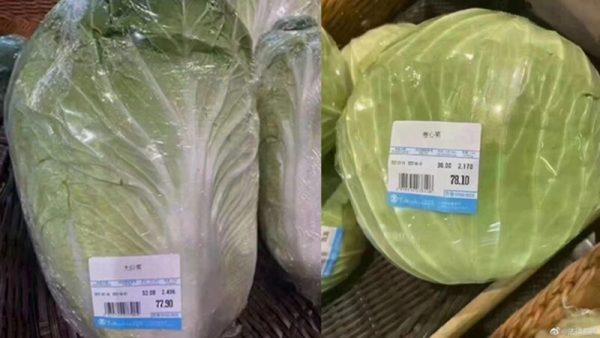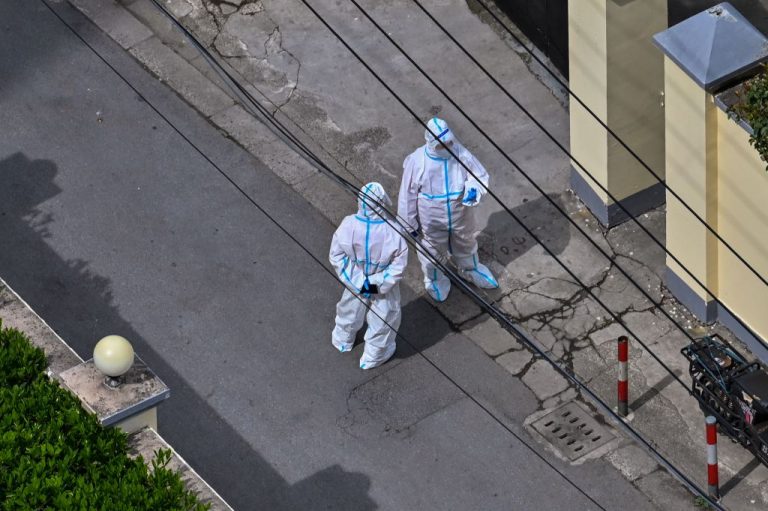Shanghai, China’s financial capital, has begun the second part of a two-phase lockdown that began on March 28 after a rapid rise in COVID-19 cases were detected over the last month.
Under the new restrictive measures, authorities placed the city’s Pudong financial district and nearby areas into lockdown lasting from March 28 to April 1. Authorities said the quarantine measures were put in place in order to allow health workers to conduct at least two rounds of mass testing.
In the second phase of the lockdown, the vast downtown area west of the Huangpu River that divides the city will start its own five-day lockdown lasting from April 1 to April 5.
Meanwhile, residents living in the eastern and southern parts of the city were hoping to return to normal life on April 1 after the four-day lockdown. However, authorities have been notifying residents that they may need to be confined inside their homes for even longer.
READ MORE:
- China Deploys Special COVID Task Force to Shanghai as Cases Skyrocket
- 26 Million People Under Shanghai Lockdown as Chinese Regime Deploys Strictest COVID Measures Since Pandemic Began
- People in Shenzhen Jump Off Buildings in Protest of Prolonged Lockdowns Under China’s ‘Zero-COVID’ Measures
As more questions are raised over the financial and economic toll the nation’s stringent “Zero-COVID” measures are taking, frustrated Shanghai residents have taken to the streets to protest the prolonged lockdowns and the rising cost of food – particularly the price of fresh vegetables.
Success
You are now signed up for our newsletter
Success
Check your email to complete sign up
Under the restrictions, residents have not been allowed to leave their residential compounds and businesses and firms that are not considered essential have been ordered to close until further notice. All public transportation has also been suspended.
Supermarkets unable to keep up as residents empty shelves
Since the two-part lockdown was announced, panic buying and the rising cost of produce have been trending topics among netizens on China’s social media platforms.
On the first day of the city’s Pudong lockdown, a mother and daughter were reported to have driven over two kilometers (about 1.2 miles) on an electric scooter in order to buy a “high-priced green onion” as nothing better was available.
Meanwhile, “sky high price of vegetables” became a trending topic on the internet.
Netizens posted online that the prices of vegetables they bought were several times higher than usual.
Residents reported spending on average:
- 48 yuan (about $7.50) for a handful of green vegetables
- 22.4 yuan (almost $4) for a single potato
- 78 yuan (about $12.20) for a cabbage
- 43.6 yuan (about $6.75) for a small handful of celery
Ms. Lu from Shanghai’s Jing’an District said that she spent about 55 yuan ($8) for a small handful of cilantro, lettuce and pumpkins weighing less than 5 lbs at her local vegetable market on March 30.

Another resident took pictures of the price of potatoes in Shanghai’s Lianhua Supermarket on March 24. The prices were listed at: 107.8 yuan/kg. (about $17/kg) Other pictures posted by netizens showed that a single potato had a price tag of 52.61 yuan ($8), while two smaller potatoes were being sold for 62.52 yuan (about $10).

An older resident, Mr. Mai from the historic district of Puxi, complained that he had downloaded a lot of grocery shopping apps in order to buy food online, but was unable to actually buy anything due to the high demand for groceries. Mai said he spent several hours trying to check out, only to be told that there was a waiting list for online purchases.
“I don’t know how other people are getting their groceries,” he said.
Cost of cabbage more expensive than a plane ticket
Another resident posted online on March 26 that cabbages in Shanghai were being sold for 78 yuan each ($12.20). The post quickly went viral with several people commenting that a plane ticket from Guangzhou to Shanghai (about 753 miles) cost only 59 yuan.
“The flight ticket from Guangzhou to Shanghai is less expensive than a cabbage!” one netizen wrote.
The post garnered so much attention that it prompted the Shanghai Supervision Bureau to fine the supplier of said cabbages by 100,000 yuan (US$15,715) and the Takashimaya Department Store, which sold the cabbages, by 500,000 yuan.
Locked-down resident: ‘We are out of food and no one cares.’
Ms. Yu, a resident of Jiading District in Shanghai told NTD Television on March 27 that she and her family have been confined inside their homes for nearly two weeks.
“We’ve been kept at home for 12 days. They let us out to buy some food on the fifth day. But now we can’t get anything because supermarkets are sold out. Some people are already out of food now.”
Another resident surnamed Yan, from the city’s Minhang District, said, “We have been held under lockdown for 10 days. There is no food at home and no one cares. They [authorities] only care whether you do nucleic acid tests.”
The prolonged lockdowns are reminiscent of when authorities in China locked down the entire city of Xi’an for over three weeks in December last year.
During this time, residents in Xi’an reported being barricaded inside their homes and essential services such as getting groceries and accessing medical services were completely halted.
Posts on social media showed desperate residents going hungry, with some even resorting to trading items such as iPhones and electronics in exchange for food and supplies.














